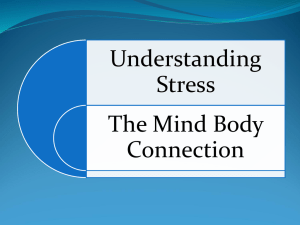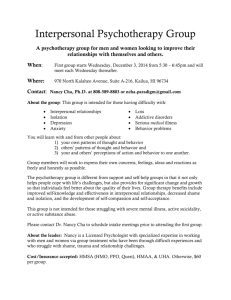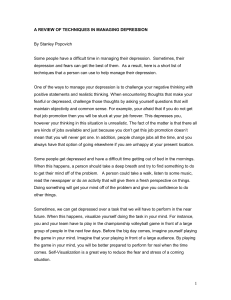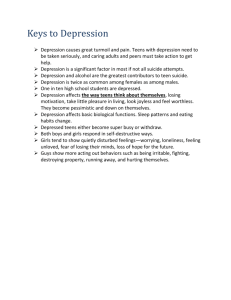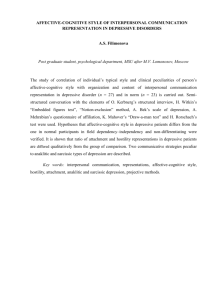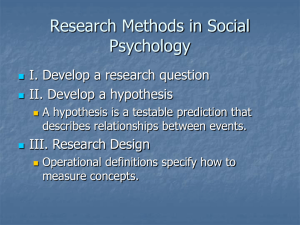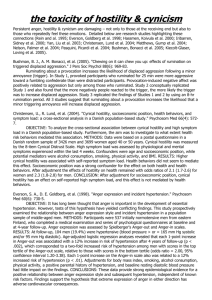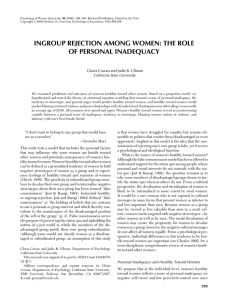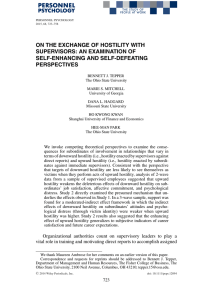Relationships are Important for our Health - Handout.
advertisement
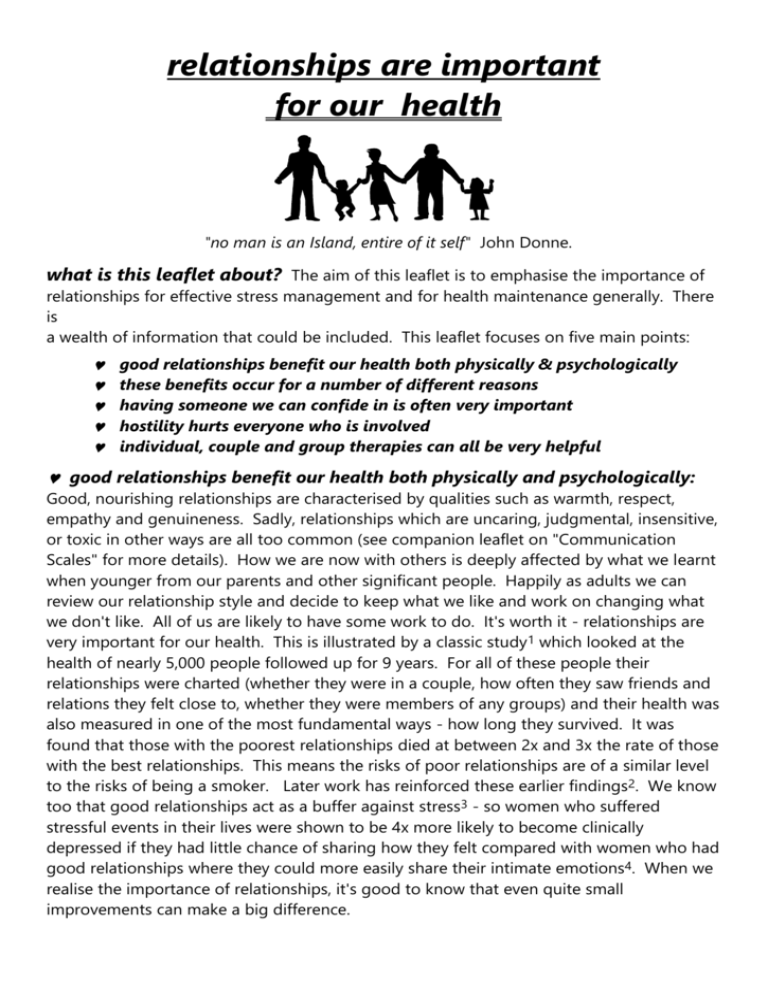
relationships are important for our health "no man is an Island, entire of it self" John Donne. what is this leaflet about? The aim of this leaflet is to emphasise the importance of relationships for effective stress management and for health maintenance generally. There is a wealth of information that could be included. This leaflet focuses on five main points: good relationships benefit our health both physically & psychologically these benefits occur for a number of different reasons having someone we can confide in is often very important hostility hurts everyone who is involved individual, couple and group therapies can all be very helpful good relationships benefit our health both physically and psychologically: Good, nourishing relationships are characterised by qualities such as warmth, respect, empathy and genuineness. Sadly, relationships which are uncaring, judgmental, insensitive, or toxic in other ways are all too common (see companion leaflet on "Communication Scales" for more details). How we are now with others is deeply affected by what we learnt when younger from our parents and other significant people. Happily as adults we can review our relationship style and decide to keep what we like and work on changing what we don't like. All of us are likely to have some work to do. It's worth it - relationships are very important for our health. This is illustrated by a classic study1 which looked at the health of nearly 5,000 people followed up for 9 years. For all of these people their relationships were charted (whether they were in a couple, how often they saw friends and relations they felt close to, whether they were members of any groups) and their health was also measured in one of the most fundamental ways - how long they survived. It was found that those with the poorest relationships died at between 2x and 3x the rate of those with the best relationships. This means the risks of poor relationships are of a similar level to the risks of being a smoker. Later work has reinforced these earlier findings2. We know too that good relationships act as a buffer against stress3 - so women who suffered stressful events in their lives were shown to be 4x more likely to become clinically depressed if they had little chance of sharing how they felt compared with women who had good relationships where they could more easily share their intimate emotions4. When we realise the importance of relationships, it's good to know that even quite small improvements can make a big difference. these benefits occur for a number of different reasons: We know that relationships can boost our health, but researchers are still working hard to understand why. It seems likely that there are direct effects - for example on blood clotting factors and our immune systems. There are also indirect effects - on lifestyles for instance and on how threatening stresses appear. Adapting a fairly well known model2 suggests five kinds of health benefit from relationships - reinforcement of self-worth, access to practical help & useful information, fun & shared activities, physical touch, and social influences encouraging healthy behaviours. [PTO] having someone we can confide in is often very important: For well over a decade, Brown and co-workers have studied the importance of relationships in helping to protect women from depression4,5. Having someone considered very close, confided in, and seen quite often seems to be of critical importance. This person could be one's partner, a friend or a relative. In times of stress this relationship seems to reduce the chances of becoming depressed by helping to preserve self-esteem. Other researchers have shown that failing to confide in others about traumatic events is associated with an increase in stress-related disease6. When one realises that traumatic events are very common (for example, see the companion leaflet on "Touch, Sex and Caring") it becomes clear how important this point is. hostility hurts everyone who is involved: Hostile, critical remarks by one's partner make a big difference to both whether one develops psychological illness and also to how well one maintains a subsequent recovery7,8,9. The children of such partnerships also suffer. Hostility and cynicism may damage the person who has these qualities even more than they damage other people10. In one classic study for example, a group of medical students had their hostility levels measured (on the MMPI) and were followed up for 25 years. Of the 255 who were available for assessment at follow-up, the 119 who had a hostility score above the median had 6.4x the death rate of the 136 who scored at or below the median11! individual, couple and group therapies can all be very helpful: Approximately 25% of women and about half that number of men will experience at least one significant depression during their lives7, so it's a common problem which can be used as an example to highlight the usefulness of different types of therapy. Medication and psychotherapy can both be very helpful. Interpersonal psychotherapy has been shown to be as or more helpful than other forms of psychotherapy for depression12. It focuses on our current relationships, particularly issues such as interpersonal disputes, grief, life transitions, and social isolation13. About 50% of women who are depressed are in a difficult marriage7. In this situation couples therapy may well be the best approach as it is as effective as individual therapy for the depression and it also has the bonus of benefiting the marriage more than individual therapy usually does7. Group therapy is under used. Clearly it provides a chance for people to learn interpersonally in a more direct way and its benefits for a whole variety of problems compare very well with individual psychotherapy14. How we relate to others is important for effective stress management and for health maintenance generally. Happily much can be done to make things better. books and references: 1. Berkman,L.F. & Syme,S.L. (1979) Social networks, host resistance, and mortality: a nine-year follow-up study of Alameda County residents, Am J Epidemiol 109: 186-204. 2. Cohen,S. (1990) Social support and physical illness, Advances 7: 35-48. 3. Cohen,S. & Wills,T.A. (1985) Stress, social support, and the buffering hypothesis, Psychol Bull 98: 310-57 4. Brown,G. & Harris,T. (1978) Social origins of depression, New York, The Free Press. 5. Brown,G. et al. (1990) Self esteem and depression: II, Soc Psychiatry Psychiatr Epidemiol 25: 225-34. 6. Pennebaker,J.W. (1990) Opening up: the healing power of confiding in others, New York, Avon Books. 7. Beach,S.R.H.,Sandeen,E.E. & O'Leary,K.D. (1990) Depression in marriage, New York, Guilford. 8. Hooley,J.M. et al. (1986) Levels of expressed emotion and relapse in depressed patients, Br J Psychiatry 148: 642-7. 9. Leff,J. (1992) Over the edge: stress and schizophrenia, New Scientist January 4th: 30-3. 10. Chesney,M.A. & Rosenman,R.H. (Eds.) (1985) Anger and hostility in cardiovascular and behavioral disorders, Washington, McGraw-Hill Book Company. 11. Barefoot,J.C.,Dahlstrom,W.G. & Williams,R.B. (1983) Hostility, CHD incidence, and total mortality: a 25-year follow-up study of 255 physicians, Psychosom Med 45: 59-63. 12. Elkin,I.,Shea,M.T.,Watkins,J.T. et al (1989) National Institute of Mental Health treatment of depression collaborative research program, Arch Gen Psychiatry 46: 971-82 13. Klerman,G.L.,Weissman,M.M. et al. (1984) Interpersonal psychotherapy of depression, New York, Basic Books. 14. Yalom,I.D. (1985) The theory and practice of group psychotherapy, New York, Basic Books.
